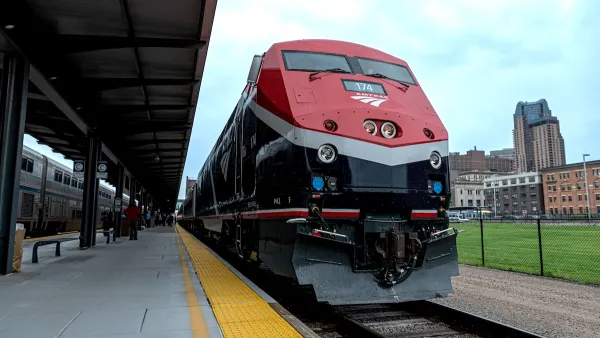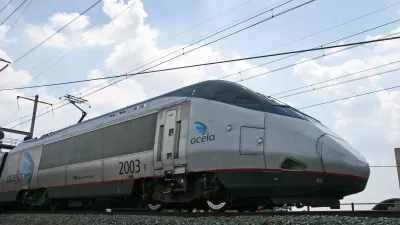"Ladies and gentlemen, welcome aboard Amtrak Train 715. We're expecting a smooth ride today and should be moving along right on time," said the voice of the train conductor over the loudspeaker. He then continued, "And thanks for joining us for National Train Day". The loudspeaker then turned off, and was followed instantly by the voice of an incredulous woman a few rows behind who said "What?"
"Ladies and gentlemen, welcome aboard Amtrak Train 715. We're expecting a smooth ride today and should be moving along right on time," said the voice of the train conductor over the loudspeaker. He then continued, "And thanks for joining us for National Train Day". The loudspeaker then turned off, and was followed instantly by the voice of an incredulous woman a few rows behind who said "What?"
What indeed. National Train Day?
Apparently there is such a thing. The first National Train Day took place May 10, 2008. It was held in honor of the "golden spike" that was driven to connect the Central Pacific and Union Pacific Railways on May 10, 1869, in Promontory Summit, Utah – creating the cross-country rail system so few of us use or even consider today.
And so it is. National Train Day in a country that all but abandoned the concept of rail transportation decades ago, and one that seems perpetually on the verge of cutting all funding to the struggling system. The Bush administration has proposed to cut Amtrak's budget by 40% in 2009, and legislators in congress are struggling to stop it from happening. Though ridership has been at record highs for the last five years, the system is still operating in the red.
I hadn't heard about National Train Day until I got on the train that day. Apparently, Amtrak was celebrating by hosting live music acts and events at the nation's four biggest stations: Washington, D.C.'s Union Station, New York City's Penn Station, Chicago's Union Station and Los Angeles' Union Station. Unless you were looking for these events, they were pretty easy to miss.
National Train Day seemed to slip under the radar of many riders on my train that day, the vast majority of whom were just trying to get from point A to point B. Maybe this is a failed holiday, or maybe it's a minor attempt at bringing some visibility to a form of transportation most Americans have never used. Whatever it is, it could stand to be more effective at bringing the idea of train transportation to the masses. Maybe they should have offered some free tickets to get people on board. Or maybe they should spread their promotional efforts out beyond one day to try to change the public's perception of the train from novelty to viable transportation option. Maybe, considering the current political climate, it's too late.
But there were some riders on my train who seemed to know it was National Train Day. They were two older men, presumably a man and his father, and each was toting a toddler, the third generation. This family of men was out for a ride to celebrate America's trains. They were touring the train in wonderment, each with National Train Day buttons stuck to their t-shirts. The two boys were crowned by conductor hats, printed out on cardstock and wrapped around their little heads. The men were holding then hands of the small boys, pointing out the window, stopping to look at the conductor taking tickets, and testing out the collection of empty seats. The men could also be overheard explaining the path of the train to the boys -- in thick British accents.
These four people, probably the only four people celebrating National Train Day in America, were British. If that doesn't tell you something about the role trains play in American life, hop on a train for next year's National Train Day. See if anyone else knows what day it is.

Planetizen Federal Action Tracker
A weekly monitor of how Trump’s orders and actions are impacting planners and planning in America.

Restaurant Patios Were a Pandemic Win — Why Were They so Hard to Keep?
Social distancing requirements and changes in travel patterns prompted cities to pilot new uses for street and sidewalk space. Then it got complicated.

Map: Where Senate Republicans Want to Sell Your Public Lands
For public land advocates, the Senate Republicans’ proposal to sell millions of acres of public land in the West is “the biggest fight of their careers.”

Maui's Vacation Rental Debate Turns Ugly
Verbal attacks, misinformation campaigns and fistfights plague a high-stakes debate to convert thousands of vacation rentals into long-term housing.

San Francisco Suspends Traffic Calming Amidst Record Deaths
Citing “a challenging fiscal landscape,” the city will cease the program on the heels of 42 traffic deaths, including 24 pedestrians.

California Homeless Arrests, Citations Spike After Ruling
An investigation reveals that anti-homeless actions increased up to 500% after Grants Pass v. Johnson — even in cities claiming no policy change.
Urban Design for Planners 1: Software Tools
This six-course series explores essential urban design concepts using open source software and equips planners with the tools they need to participate fully in the urban design process.
Planning for Universal Design
Learn the tools for implementing Universal Design in planning regulations.
Heyer Gruel & Associates PA
JM Goldson LLC
Custer County Colorado
City of Camden Redevelopment Agency
City of Astoria
Transportation Research & Education Center (TREC) at Portland State University
Camden Redevelopment Agency
City of Claremont
Municipality of Princeton (NJ)





























